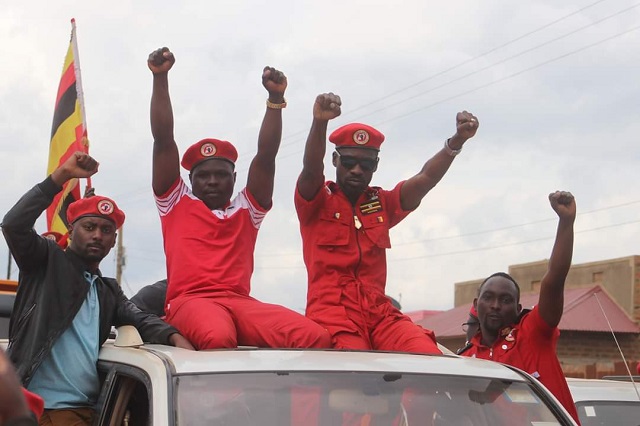
It could mean more than just dress
COMMENT | GARHE OSIEBE | Across Africa, politicians are using personal fashion to communicate. From red berets, to all-khaki ensembles, to full-on cosplaying, leaders across the continent have a robust relationship with fashion.
Despite their larger-than-life impact, politicians are humans. Fashion is useful to the political class for a number of reasons. They include: improving charisma, access to respect and recognition, and to distract or focus attention. Fashion is also a richly privileged site from which to survey a society. Some of the political values of certain leaders are exposed by their fashion choices.
Beret benefits
Red berets are a mainstay of African political fashion. Directly inspired by the iconic styles of revered leaders Che Guevera and Thomas Sankara, the red beret has been adopted by many African politicians campaigning for radical revolution.
South Africa’s Julius Malema and members of the Economic Freedom Fighters (EFF) use the red beret as a uniform. Bobi Wine’s quest to unseat a 34-year-old dictatorship in Uganda appropriates the red beret as a symbolic fashion accessory.
In Nigeria, Omoyele Sowore is also a “red beret politician”. After losing out at the country’s 2019 presidential elections, the human rights advocate has sustained a series of protests tagged “Revolution Now,” to incite mass action against the ruling government. His followers are easily recognised by their berets.
Beyond berets, fashion and African politics find common ground in multiple ways. On his last day in office, Ayodele Fayose, the former governor of Ekiti State, Nigeria, raised heads when he turned up to the headquarters of local financial crimes watchdog, the Economic and Financial Crimes Commission (EFCC).
Fayose was sporting a t-shirt with the bold inscription “EFCC I’M HERE!” His retinue comprising of more politicians, sported similar outfits to show solidarity and defiance. He was never officially charged with a crime.
On the flip side of the war against corruption in Nigeria, fashion can also be an accessory for criminal activities. In 2018, the current governor of Kano State, Abdullahi Ganduje, was “exposed” via viral videos showing him pocketing bundles of dollar bills gotten as kickbacks from awarding construction contracts. Although he is yet to face prosecution, his large flowing robe, aka Babariga, became the unlikely star of the news.
Due to its huge pockets suitable for storing and transporting illegal proceeds, it is considered the perfect outfit for political corruption. For his efforts, Ganduje has since been nicknamed “Gandollar”.
Nigeria’s political fashion style also contains vestiges of the country’s past dictatorships. The 90’s transition from military rule to democracy saw would-be political leaders swap their military khakis with traditional civilian attires. Yet, years later, the nation’s military past continues to linger in political fashion.
Adams Oshiomhole, the recently ousted Chairman of the country’s ruling party, the All Progressives Congress (APC), is famous for his trademark civilian khakis. Once renowned as a tough leader of the Nigeria Labour Congress (NLC), Oshiomhole became the people’s hero by repeatedly standing up to the government and negotiating petroleum product prices to favour the masses. He has since transitioned from labour leader to a two-term Edo state governor, before becoming party chairman and embattled godfather.
Oshiomhole’s khaki outfits now command a cult following among his hometown politicians and their associates. The current deputy governor of Edo State, Philip Shaibu is from Oshiomhole’s hometown. Shaibu and his aides officially dress in comrade khakis as tribute to Oshiomhole, and a symbol of their commitment to democratic struggle. It should be interesting to see how Shaibu and his aides get on with the khaki attires now that Oshiomhole’s godfatherism has suffered a setback in the last state elections.
Through a 12-year stint (2007-2019) in Nigeria’s houses of parliament, Dino Melaye’s flamboyance made a mark on the political wardrobe of post-colonial Nigeria. A social media exhibitionist, Melaye first entered political fashion’s hall of fame in 2010, after his attire was shredded, during a forceful eviction from the chambers of the House of Representatives.
While making a music video cameo, Melaye had the inscription “LEGEND” written on a shirt. For his 44th birthday party, he threw a lavish ‘Pirates of the Caribbean’ themed party where he was dressed as heroic fictional character, Captain Jack Sparrow. And in another episode, Melaye wore a graduation gown to the senate plenary session of Nigeria’s national assembly so as to drum home his contested tertiary education credentials.
Drip is forever
Beyond these, post-colonial Africa has a history of politicians deploying quirky fashion styles to dramatise their magnificence. Congo’s Mobutu Sese Seko had a wardrobe dominated by animal skin. But his love of Western-influenced special “abacost” suits, betrayed his rhetoric of nationalism aka Zairianisation.
Cameroon’s Paul Biya and his family continue to polarise the public by sporting elite luxury fashion brands at public appearances. Sunglasses are also a constant in African leadership spaces. They were the favourite accessories for Libya’s Muammar Gaddafi, Togo’s Gnassingbé Eyadéma, and Nigeria’s Sani Abacha. Liberia’s ex-President, Ellen Johnson Sirleaf, also distinguishes herself through colourful outfits.
Fashion has the power to influence governments. The correlation between the fashion and leadership style of African politicians ought to be explored for insights. Fashion statements by politicians can subvert important governmental concerns. They can also draw attention to unnecessary concerns that have no impact on the electorate. Politicians can also use fashion statements as a tool of propaganda to manipulate the public.
****
Garhe Osiebe is Postdoctoral Research Fellow, Rhodes University
 The Independent Uganda: You get the Truth we Pay the Price
The Independent Uganda: You get the Truth we Pay the Price




Dress for less with fashion World’s wide range of clothing for women and kids. Shop dresses, tops, shoes, jeans, jackets, accessories and more online or in-store. Get the trends at the best prices and get your order delivered for free at any Fashion World store in South Africa.